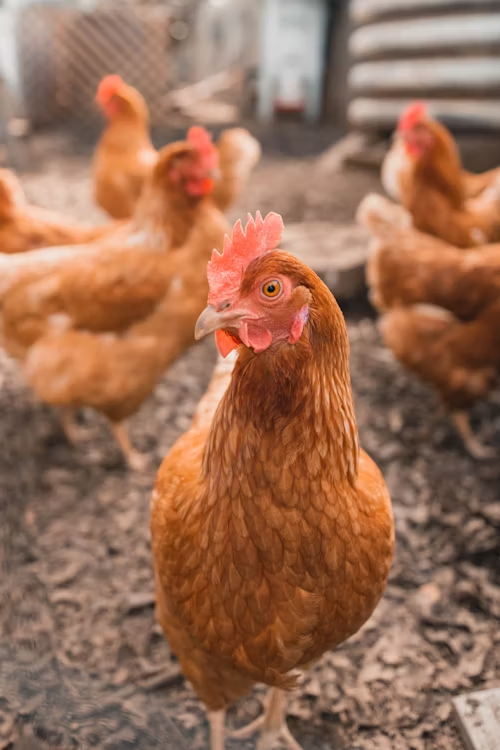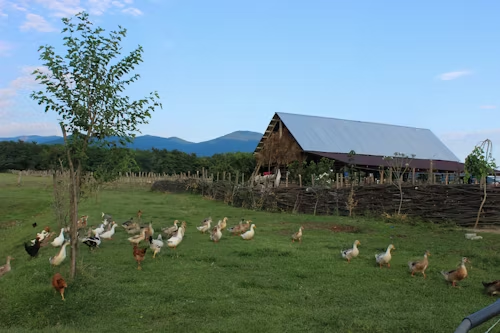Learn to identify and address health problems before they become serious, keeping your flock happy and productive.
Even with the best care, backyard chickens can sometimes develop health issues. The good news is that many common problems can be prevented or treated effectively if caught early. This guide will help you recognize symptoms, understand causes, and take appropriate action when your chickens aren't feeling their best.
Important: This article provides general information for backyard chicken keepers, but is not a substitute for veterinary care. Always consult a poultry veterinarian for serious or persistent health issues.
Respiratory Issues
Respiratory problems are among the most common health concerns in backyard flocks.
Infectious Bronchitis
Symptoms
- Coughing, sneezing, and gasping
- Nasal discharge
- Reduced egg production
- Watery eggs with thin shells
Treatment & Prevention
- Isolate affected birds
- Provide warm, dry housing with good ventilation
- Administer antibiotics only as prescribed by a vet
- Vaccination is available for prevention
Mycoplasma Gallisepticum (Chronic Respiratory Disease)
Symptoms
- Nasal discharge and foamy eye secretions
- Swollen sinuses and face
- Wheezing and rattling sounds
- Decreased egg production
Treatment & Prevention
- Antibiotic treatment under veterinary guidance
- Isolate affected birds
- Thoroughly clean and disinfect housing
- Screen new birds before adding to flock

External Parasites
External parasites are a common nuisance that can affect chicken health and egg production if left untreated.
Mites (Red Mites, Northern Fowl Mites)
Symptoms
- Irritation, excessive preening
- Pale combs due to anemia
- Decreased egg production
- Mites visible on birds (usually red or dark) or in cracks of housing
- Blood spots on eggs
Treatment & Prevention
- Treat birds with approved poultry dust or sprays
- Thoroughly clean and treat coop with approved products
- Provide dust bathing areas with diatomaceous earth
- Regular coop inspections using a flashlight at night
Lice
Symptoms
- Irritation and feather loss
- Excessive preening
- White or straw-colored bugs visible on skin or at base of feathers
- Clusters of tiny eggs (nits) at feather bases
Treatment & Prevention
- Apply approved poultry insecticide dust or spray
- Repeat treatment in 7-10 days to kill hatching eggs
- Treat coop and bedding
- Provide dust bathing areas
Internal Parasites
Internal parasites can cause significant health problems if not addressed promptly.
Worms (Roundworms, Cecal Worms, Gapeworms)
Symptoms
- Weight loss despite normal eating
- Pale combs and wattles
- Diarrhea or abnormal droppings
- Decreased egg production
- Gasping or gaping (specific to gapeworms)
- Visible worms in droppings (severe cases)
Treatment & Prevention
- Treat with approved poultry dewormer
- Clean coop thoroughly and remove old bedding
- Rotate grazing areas if possible
- Regularly remove droppings from coop and run
- Routine fecal testing and preventative deworming schedule
Coccidiosis
Symptoms
- Bloody diarrhea
- Lethargy and weakness
- Huddling, ruffled feathers
- Poor growth in young birds
- Pale combs and wattles
Treatment & Prevention
- Administer anticoccidial medication
- Provide electrolyte solution to prevent dehydration
- Keep litter dry and clean
- Consider medicated starter feed for chicks
- Coccidia vaccination available for prevention

Common Diseases
Fowl Pox
Symptoms
- Wartlike growths on unfeathered areas (dry form)
- White canker-like lesions in mouth and throat (wet form)
- Reduced egg production
- Difficulty eating or breathing (wet form)
Treatment & Prevention
- No specific treatment, but supportive care helps recovery
- Isolate affected birds
- Apply gentle iodine to lesions
- Vaccination available for prevention
- Control mosquitoes (vectors)
Marek's Disease
Symptoms
- Paralysis of legs, wings, or neck
- Irregular pupils or blindness
- Weight loss
- Gray, enlarged feather follicles
Treatment & Prevention
- No treatment available
- Vaccination at hatchery is extremely important
- Purchase vaccinated chicks
- Good biosecurity practices
Egg Laying Issues
Egg Binding
Symptoms
- Straining without producing an egg
- Lethargy, sitting frequently
- Penguin-like stance
- Abdominal distention
- Decreased appetite
Treatment
- Warm bath soak for 15-20 minutes
- Apply lubricant to vent
- Keep hen in warm, quiet environment
- Calcium supplementation after resolution
- Veterinary assistance for severe cases
Prolapsed Vent (Oviduct)
Symptoms
- Tissue protruding from vent
- Blood on protruding tissue
- Straining
- Other hens may peck at prolapse
Treatment
- Immediately isolate from flock
- Clean area gently with warm water
- Apply hemorrhoid cream or honey to reduce swelling
- Gentle reinsert tissue if possible
- Keep in dark, quiet area
- Veterinary assistance recommended
Setting Up a Chicken First Aid Kit
Being prepared for emergencies is essential. Here's what to include in your chicken first aid kit:
- Styptic powder: To stop bleeding from minor cuts
- Poultry-safe antiseptic: For cleaning wounds
- Vetericyn or similar wound spray: For treating injuries
- Antibiotic ointment: For minor cuts (without pain reliever)
- Gauze pads and vet wrap: For bandaging
- Tweezers and scissors: For removing foreign objects or cutting bandages
- Epsom salt: For foot soaks and cleaning wounds
- Petroleum jelly: For treating scaly leg mites and protecting combs in winter
- Electrolyte powder: For sick or stressed birds
- Vitamin supplement: To support recovery
- Small animal thermometer: Normal chicken temp is 105-107°F
- Disposable gloves: For hygiene when treating birds
- Towels: For restraining chickens during treatment
Prevention: The Best Medicine
Many chicken health problems can be prevented with good management practices:
- Quarantine new birds for at least 30 days before introducing to your flock
- Maintain clean, dry living conditions with good ventilation
- Provide clean water and appropriate feed for their age and purpose
- Allow access to dust bathing areas to help control external parasites
- Practice good biosecurity by limiting visitors and using dedicated footwear
- Perform regular health checks to catch issues early
- Maintain appropriate stocking density to prevent stress and disease spread
- Follow a vaccination program appropriate for your area
When to Call a Veterinarian
While many minor issues can be handled at home, certain situations require professional care:
- Multiple birds showing similar symptoms
- Severe breathing difficulty
- Significant bleeding or injury
- Prolonged inability to stand or walk
- No improvement after 24-48 hours of home treatment
- Egg binding not resolved within 24 hours
- Prolapsed vent not improving
- Unusual or rapid death of flock members





Comments (2)
Maria T.
June 5, 2023Thank you for this comprehensive guide! I noticed some of my hens had been scratching more than usual and found mites after inspecting them with a flashlight. Followed your treatment advice and they're doing much better already.
Robert L.
June 7, 2023Could you do a future article specifically about natural/herbal remedies for chicken health? I try to avoid chemicals when possible and would love to know what natural options are effective.
Maya Chen
June 7, 2023Great suggestion, Robert! We're actually working on a series about natural remedies and preventative care using herbs and other natural products. Look for it next month! Apple cider vinegar, garlic, and herbs like oregano can be beneficial in some situations.
Leave a Comment